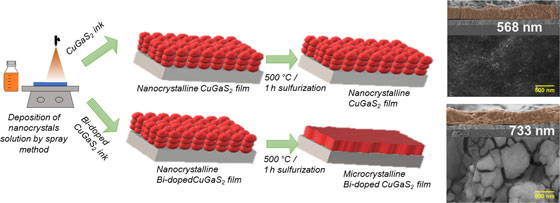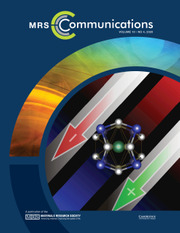Crossref Citations
This article has been cited by the following publications. This list is generated based on data provided by
Crossref.
Khan, Karina
Gaur, Aditi
Soni, Amit
Ahuja, U.
and
Sahariya, J.
2021.
Emerging Technologies for Smart Cities.
Vol. 765,
Issue. ,
p.
171.
YİĞİT GEZGİN, Serap
HOUIMI, Amina
MERCİMEK, Bedrettin
and
KILIÇ, Hamdi Şükür
2022.
The Investigation of Photovoltaic and Electrical Properties of Bi Doped CTS/Si Hetero-Junction Structure for the Solar Cell Application.
Cumhuriyet Science Journal,
Vol. 43,
Issue. 1,
p.
137.
Brito, Juliana Ferreira de
Andrade, Marcos Antonio Santana
Zanoni, Maria Valnice Boldrin
and
Mascaro, Lucia Helena
2022.
All-solution processed CuGaS2-based photoelectrodes for CO2 reduction.
Journal of CO2 Utilization,
Vol. 57,
Issue. ,
p.
101902.
Vijayan, Karthikeyan
and
Vijayachamundeeswari, S. P.
2023.
Scrutinizing the effect of substrate temperature and enhancing the multifunctional attributes of spray deposited copper gallium sulfide (CuGaS2) thin films.
Phase Transitions,
Vol. 96,
Issue. 8,
p.
607.
Balachandran, M.
Thiyakarajan, C.
Ramprasath, R. Hari
Logu, T.
and
Sethuraman, K.
2023.
Investigation on visible spectral response of spray coated Ni doped CuGaS2 thin films for photodetector application.
Optical Materials,
Vol. 146,
Issue. ,
p.
114559.
Supriya, Subramani
2023.
Crystal Structure Engineered Non-toxic Bi0.5Na0.5TiO3 Based Thin Films-Fabrication Process, Enhanced Electrical Performance, Challenges and Recent Reports.
Journal of Inorganic and Organometallic Polymers and Materials,
Vol. 33,
Issue. 10,
p.
3013.
Krishna, Sreelakshmi
and
Vasu, V.
2024.
Preparation and characterization of pristine and Sn doped copper gallium sulphide (CGS) thin films using spray pyrolysis technique.
Heliyon,
Vol. 10,
Issue. 3,
p.
e25425.
Priyadarshini, Priyanka
Senapati, Subrata
Mohapatra, Ashutosh
Pradhan, Monalisa
Alagarasan, Devarajan
and
Naik, Ramakanta
2024.
Morphological evolution of individual microrods to self-assembled 3D hierarchical flower architectures of CuBixIn1−xSe2 for photo response applications.
Journal of Materials Chemistry C,
Vol. 12,
Issue. 8,
p.
2879.
Vyshakh Viswanath, N
Radhakrishnan, Jagan
and
Biswas, Krishnendu
2025.
A comprehensive review of synthetic methodologies, photo/photoelectro-catalytic hydrogen evolution performance and pollutant degradation capabilities of CuGaS2 based materials.
International Journal of Hydrogen Energy,
Vol. 179,
Issue. ,
p.
151588.
Priyadarshini, Priyanka
Senapati, Subrata
Kumar, Prabhukrupa Chinmay
and
Naik, Ramakanta
2025.
2D hexagonal CuBixGa1−xSe2 nanosheets for a visible light photodetector.
Journal of Materials Chemistry C,
Vol. 13,
Issue. 8,
p.
4246.
Balachandran, M.
Thiyakarajan, C.
and
Sethuraman, K.
2025.
Scrutinization of cobalt-doped CuGaS2 thin films prepared by spray pyrolysis method for photodetection applications.
Journal of Materials Science: Materials in Electronics,
Vol. 36,
Issue. 5,



